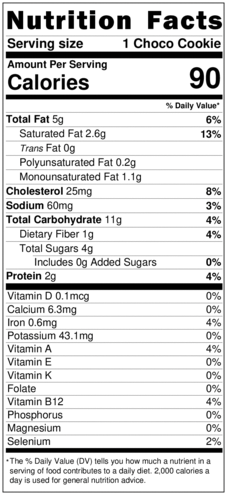12 Cookies
Oats, Organic coconut sugar, Egg, Butter, Salt, and Dark Chocolate
Stored in an airtight container for :
Up to 5 days in room temperature
Up to 15 days in fridge.
Egg , Butter ( Lactose ) , Coconut products
- Oats: Oats are a good source of dietary fiber, which can aid in digestion, help regulate blood sugar levels, and promote feelings of fullness. The nutrition facts show 1g of dietary fiber per cookie, contributing a small amount to your daily intake.
- Organic Coconut Sugar: Natural sweetener, there is 4g of total sugars per cookie, with 0g of added sugars (meaning the sugar comes from the coconut sugar itself and potentially the dark chocolate).
- Egg: Eggs provide protein (2g per cookie), which is essential for muscle building and repair, as well as satiety. They also contain various vitamins and minerals.
- Salt: Salt provides sodium (60mg per cookie, contributing 3% of the daily value)
- Dark Chocolate: Dark chocolate, especially varieties with a high cocoa content, can offer antioxidants.
The best time to eat these cookies depends on your individual needs and lifestyle:
- As a Treat/Snack: They can be enjoyed as a small treat or snack between meals. Be mindful of portion sizes due to the calorie and sugar content.
- With a Balanced Meal: Eating them as part of or after a balanced meal can help mitigate blood sugar spikes compared to eating them on an empty stomach.
- Before Physical Activity (with caution): The carbohydrates can provide a quick source of energy. However, due to the fat content, it might not be ideal immediately before intense exercise as fat digestion is slower. Experiment to see how your body responds.
- After Physical Activity (for recovery): The carbohydrates can help replenish glycogen stores, and the protein can aid in muscle repair. However, you would likely need additional protein and potentially less fat post-workout depending on your fitness goals.
Whether these cookies are "good" for a workout depends on when you eat them and your overall dietary needs for exercise:
- Before a Workout (Potentially Okay in Small Amounts): The carbohydrates can provide some energy. However, the fat content might lead to digestive discomfort for some people during exercise. A very small portion a while before could be considered, but easily digestible carbohydrates are generally preferred.
- During a Workout (Not Ideal): Cookies are not typically a good choice for fueling during exercise due to their fat and sugar content, which can cause energy crashes and digestive issues.
- After a Workout (Potentially Okay in Moderation): The carbohydrates can help replenish energy stores, and the protein contributes to muscle repair. However, you would likely benefit from a higher protein intake and potentially lower fat intake post-workout. A small cookie as part of a more balanced post-workout snack or meal could be acceptable.
Compared to many commercially produced cookies, our choco cokkies has some advantages :
- Whole Grains: Oats provide whole grains and fiber, which are generally beneficial.
- Less Processed Sugar: Organic coconut sugar might be considered less processed than refined white sugar.
- Real Ingredients: We are using recognizable, whole ingredients.
- Lower Added Sugar: No added sugars beyond what's naturally present in the coconut sugar and dark chocolate.
It's important to remember that these cookies are still a delicacy and should be eaten in moderation as part of a balanced diet.
Moderation is key to enjoying these benefits without overindulging.
For diabetes and insulin resistance, it is recommended to eat only one piece 1-3 times a week after a full meal, depending on the daily calories specified.
- Diabetes
- Insulin resistance
- POS
- Hypertension
- High cholesterol
- Gluten free
- Low FODMAP Diet ( Sibo & IBS )
- Trans Fat
- Gluten
- Sodium
1. Moderation is Key:
- They are still cookies. They contain calories, fat, and sugar. Consuming them in excess can contribute to weight gain and other health issues associated with high sugar and fat intake.
- Be mindful of portion sizes. One cookie is the serving size according to your nutrition facts.
2. Blood Sugar Levels:
- Coconut Sugar: While some studies suggest coconut sugar has a slightly lower glycemic index than refined sugar, it is still a form of sugar and will impact blood glucose levels.
Individuals with diabetes or insulin resistance should monitor their intake and be mindful of how these cookies affect their blood sugar.
3. Saturated Fat Content:
- Butter: Butter is a significant source of saturated fat (2.6g per cookie, 13% of the daily value). High intake of saturated fat can contribute to increased LDL ("bad") cholesterol levels in some individuals, potentially raising the risk of heart disease. Enjoy these cookies in moderation as part of a diet that emphasizes unsaturated fats.
4. Calorie Density:
- At 90 calories per cookie, the calories can add up quickly if multiple are consumed. Be aware of your overall calorie intake and factor these cookies in accordingly, especially if you are managing your weight.
5. Individual Health Conditions :
- If you have any pre-existing health conditions, such as heart disease, high cholesterol, diabetes, or food allergies/sensitivities, it's always best to consult with a healthcare professional or a registered dietitian to determine if and how these cookies fit into your specific dietary plan.
6. Salt :
Salt provides sodium (60mg per cookie, contributing 3% of the daily value), which is an essential electrolyte.
However, excessive sodium intake can be detrimental to health, so moderation is key.



